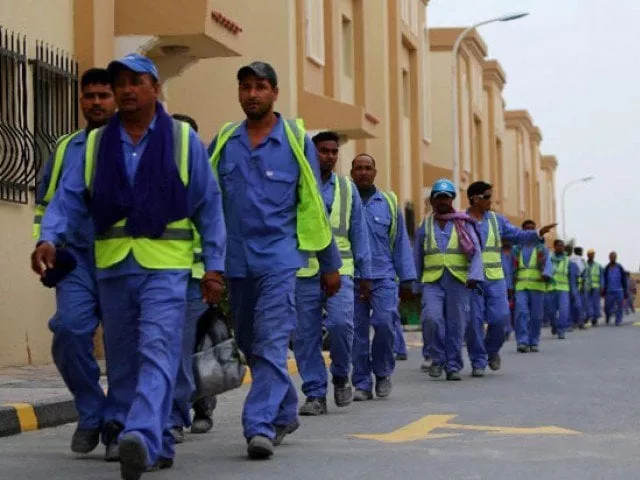ADB expects massive hit to Pakistan’s remittances
Anticipates 27% decline in inflows due to global lockdowns, loss of jobs, drop in income
The Asian Development Bank (ADB) has placed Pakistan among the five worst-affected Asian economies as the inflow of workers’ remittances may be hit by a massive 27% due to loss of jobs and drop in income of expatriates, mainly in the oil-producing and exporting nations.
The projected inflow, however, is in contrast to the government of Pakistan’s estimate of a moderate fall in remittances following the reopening of global economy with the ease in lockdowns.
The Manila-based development bank has said that the coronavirus (Covid-19) outbreak risks devastating impact on economies around the world, including widespread unemployment and lower incomes. Results show that the Covid-19 impact on remittances ranges from a 5.2% decline from baseline remittances in 2018 for the least-affected economy to almost a 30% decline for the most-affected one.
The ADB placed Pakistan on the fourth number among the likely five worst-affected Asian developing economies after Nepal, Tajikistan and Bangladesh. Remittances to Pakistan could fall by 26.8%, said the bank in its latest report on “Covid-19 Impact on International Migration, Remittances and Recipient Households in Developing Asia.”
Pakistan received workers’ remittances worth $19.62 billion in FY18 and $21.74 billion in FY19. They grew to a record high of $23.10 billion in FY20 with “an increase of 7.8% during the March-June 2020 pandemic period compared with the corresponding period of 2019,” Pakistan’s central bank reported the other day.
In Sri Lanka, the ADB said, while measures were primarily aimed at keeping the overall health of the country’s external position, exemptions for inward remittances from exchange control regulations and taxes as well as giving protection under the banking secrecy provisions would necessarily benefit remittance-recipient households.
“A similar measure was introduced in Pakistan, which has contributed to a surge in remittance inflow for the first half of the year.”
Talking to The Express Tribune, Pakistan Kuwait Investment Company (PKIC) Head of Research and Development Samiullah Tariq said, “The Ministry of Finance’s latest economic outlook has not projected as much weakness in workers’ remittance inflows as the ADB has shown. The ministry has projected a moderate fall in inflows and a notable growth in export earnings.
“Workers’ remittances have the potential to grow 3-4% from the record high of $23.10 billion received in the previous fiscal year (ended June 30, 2020) or stay pegged, but they would not shrink from the FY20 level,” he said.
The share of remittances stands at 8% in the gross domestic product (GDP). They are a very rich source of the country’s foreign income. They were even higher than the cumulative export earnings of $21.39 billion in FY20.
“The current account deficit of $2.9 billion (1.1% of GDP in FY20) will double if the remittances fall only 10%. The situation is not as grim as the ADB has projected,” he said.
Any fall in remittances would impact the country’s foreign currency reserves and increase pressure on the rupee against the US dollar and other major currencies.
Secondly, crude oil prices hover above $40 per barrel in the world market compared to $60-70 in January and February this year. One-fourth of total imports of Pakistan comprises oil, gas and coal. “The comparatively low oil prices will offset the impact of any fall in remittances,” he said.
Economic activities have picked up very quickly with a massive drop in new infection cases in recent weeks. “Cement and fertiliser consumption grew very strongly in July and tax collection remained much higher than the target for the month. All these developments are pointing out that things are improving rapidly,” he said.
For July 2020, it is expected that workers’ remittances may remain within the range of $1.8-2 billion due to Eidul Azha (which fell on August 1) and revival of economic activities,” according to the Ministry of Finance’s latest economic outlook.
This would, however, be significantly lower than the record high remittances of $2.47 billion received in June 2020. The ADB said remittances to Asia and the Pacific, amounting to $315 billion in 2019, were an important and stable source of income for families back home and helped strengthen external financing - alongside foreign direct investment and tourism receipts - in many developing economies.
They boost general consumption as well as investment and help sustain government debt by contributing to the foreign currency revenue base.
Published in The Express Tribune, August 4th, 2020.
Like Business on Facebook, follow @TribuneBiz on Twitter to stay informed and join in the conversation.


COMMENTS
Comments are moderated and generally will be posted if they are on-topic and not abusive.
For more information, please see our Comments FAQ